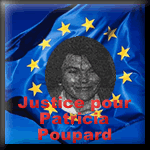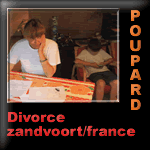| Organe de presse | ||||
| HOME | ||||
|
Chose
your language |
|
|||||||||
| Droit Fondamental | |||||||||
 |
 |
Eu-justice for Patricia Poupard
The EU Parliament has opened on 26 April 2010, the petition "Organized paedocriminality: systematic violation of fundamental rules of international law within the EU" about the multiplication of wilful faults of procedure in the treatment of the Zandvoort file, to cover-up State deficiencies. We request from France to respect the fundamental rights of a mother victim, Patricia Poupard, amongst others, to be judged on a complete dossier, with the assistance of a lawyer.
BORDEAUX. Patricia Poupard believed to have met an eccentric artist who lived in a van because he was divorcing. She married without knowing it, to a pimp whose first wife had been imprisoned in connection with a call girls "business". She met the oldest friends of her husband only when their son was three years old. The child had discovered thirty bags containing paper wrapped white powder and silver. It was the loot of an old Mafioso who had just died. Patricia Poupard was beaten-up by her husband and his friends, three men taking turns to beat a woman in front of her son, as Mafia can do to intimidate those who wish to expose them. The police had then not found appropriate to recover the loot of the old Mafioso. Patricia Poupard filed for divorce on the grounds of unfaithfulness, violence and addiction. She was in a state of shock from an inability to work for one month. She had also discovered that her husband had registered in his name, a jewellery store that she had paid with her own money.
No one shall be tried twice by the same judges, except when state deficiencies are likely to trigger the wrath of the taxpayers. Clear the State from its faults requires violation of procedures that all the magistrates do not accept. Judges Loumaigne, Guenard and Lafossa assured the dismissal of all charges against the pimp. When his son accused him of not having protected him from the sexual abuse of his friends, they cleared the father by giving him the main residence of the child, despite doctors' certificates that had clearly established the situation of danger, and before he had to answer of sexual abuse. They even rejected his own confession of infidelity and violence on his wife: - "The two medical certificates for 23 and 8/28/1997 do not assert a cause of deliberate violence the right cheekbone and bruising to the left ear and the trauma of the cervical spine, or identify the perpetrator in that case", according to Judge Isabelle Loumaigne.
Bernard Bertossa, the Attorney General in Geneva, invited Patricia Poupard, on commission, to view a fraction of file "Apollo" of the paedophile network of Zandvoort, on 14 July 2000 in Switzerland. The complete dossier includes 88'539 photographs of child pornography and torture, which fed magazines and websites for advertising films with real crimes. Marcel Vervloesem had followed on the behalf of the Belgian NGO Morkhoven, a paedocriminal network of Antwerp and discovered this file in Zandvoort, Holland, in June 1998. The Zandvoort network was employing the prostitution milieu and the activists groups for the decriminalization of sexual relationships between adults and children to assure the production.
Morkhoven had split the file, so that police could make the difference between originals and copies given to organizations of human rights, in order to trigger procedures. The CIDE, International Committee for the Dignity of Children, undertook the mission for Switzerland. However, the Swiss letters of request reached France, but never in Belgium. Mothers rushed from France, actually to see a fragment of a file. Patricia Poupard claimed damages when her son recognized himself on the picture of a boy as an adult positioned to expose a dilated anus and she recognized another child of his entourage.
George Glatz, MP, senior official of the child welfare and head of the CIDE, promised political asylum in Switzerland to parents who fled the wilful procedural defects. None of them imagined that Switzerland grants books applicants for political asylum, then denies applications from nationals of states deemed democratic. The parents, who live legally in Switzerland, were sentenced for parental kidnapping in their own country, arrested by Interpol and jailed. A Belgian mother fell into the trap in 1997. Around thirty French and Spanish mothers would have fallen into the trap between 2000 and 2001 at the invitation of the Attorney Bertossa to view a portion of the file Zandvoort in Geneva. None of them have been advised that the Werkgroep Morkhoven could assure them to be judged on a complete dossier, and the Werkgroep Morkhoven was not advised that they were judged in the absence of 80,000 items to their dossier.
Belgium has closed the complaint of Morkhoven on the Zandvoort network without trial, because there was evidence that Marc Dutroux and Michel Nihoul had been in contact with the network of Zandvoort. Three percent of the Belgian population had invaded the streets of Brussels to protest against the corruption that had resulted in nine kidnappings and four murders of young girls in the Dutroux case. The Belgian Ministers of Justice had, during the ten-year investigation conducted by Morkhoven, responded to numerous parliamentary questions on alleged corruption, by insulting Morkhoven to clear the Antwerp police. The complaint of Morkhoven and its 88'539 unique evidence were then placed in the Belgian state secret.
The Danielle RINGOT March 20, 2003, made the most famous closing of dossier of the French history, based on a single CD-ROM of 8700 photos, thus in absence of 80’000 evidence from the file. She has released all the accused, including a magistrate, invited to a conference by George Glatz in 1996, identified by him without trousers in the paedophile dossier Coral, then in the Zandvoort dossier. Nobody has notified Patricia Poupard of the closing of the dossier, which only left her ten days to appeal. France and Switzerland had thus opened the door of the prisons to French mothers trapped by the offer of political asylum.
Patricia Poupard was arrested by Interpol in Switzerland and remanded in custody in France on 1 April 2004, after having lived three years legally in Switzerland. The prison of Bonneville has confiscated from her an analysis of the laboratory Brunnhof AG of Bern, which proves that her son was carrying a venereal disease at the age of seven, and gave it back to her only two years after trial. She was judged in the absence of Zandvoort file, which had classified state secret, and forbidden of access. The investigation of the Zandvoort file was supposed to have led to the first wife, who had been jailed in the framework of a pimping case, since the production of pornography is done in this milieu. Patricia Poupard had no idea of whom she was facing, because these people were investing the money earned from prostitution, in shops and craft stalls, apparently perfectly honest.
Patricia Poupard was illegally kept in custody for twenty-six days, when she was sentenced August 27, 2004 to eighteen months in prison with nine months suspended, for having "opposed to natural relationship between a father and son". Preventive detention could not exceed four months for the acts alleged against her according to European Law, but no one was there to tell her that. The total effective sentence could not exceed four and a half months, according to French law. She was all the same kept in custody for a year, through a psychiatric jailing, again in violation of all the French laws. The Supreme Court, which then presided by a friend of judge without trousers, took almost eleven months to reject the appeal by order of non-admission, which requires no motivation, then another month to advise her of it.
Patricia Poupard could not be released immediately, because all her belongings would have vanished in public sale when she was in Switzerland. Yet, the legal documents showing what was sold, how much and to whom has also vanished, which presumes theft. She, who arrived in prison in good health and lived of benefits of her own jewellery before her divorce, now lives of a survival allowance reserved to the handicapped people (COTOREP). Her ex-husband, who lived in a van before they met, then lived of the benefits of two jewellery stores.
The doctor of Patricia Poupard discovered that the psychiatrists had prescribed her chemotherapy without cancer. Judge Loumaigne took advantage of the confinement to deprive her of parental authority in her absence, "so the father could take the decisions necessary to educate the child without risk of interference”. She confirmed her own judgment, so that the father could, "without interference" limit the contact between mother and son to only a few minutes of telephone, at 2 or 6 months distance.
No judge has accepted to comment the Swiss laboratory analysis proving that the child had a venereal disease at the age of seven. The lawyer Alexandra Baudouin, ironically a member of the Research Centre for Information and Consultation on the Rights of the Child of Bordeaux, has obtained to condemn a mother to pay moral damages to the father and withdraw her right to judiciary assistance, for having sought the custody of her son. The Supreme Court has refused a lawyer to Patricia Poupard, but does not judge the case, to delay her ability to seek a ruling by the European Court of Human Right.
The court in chambers of Bordeaux has refused the requests of Patricia Poupard be judged on a complete dossier with the assistance of counsel, and sentenced her for "interference in the private" of her former husband, none other than the publication on Internet of the evidence that her son suffered from a venereal disease at the age of seven. The court of Tarascon has ruled that two hours head-to-head twice in six years respected the right of the child to maintain personal relations and direct contact with his mother and that he would follow his father in Noumea, at 30 hours plane distance from his mother. A 10-years-old boy has thus been sentenced to wait for majority to discover he has a bright and charming mother, who has kept her balance, despite outrageous inhuman treatment. The appeal has to be treated in June, but the judicial authority has not yet assured Patricia Poupard a lawyer to assist her.


